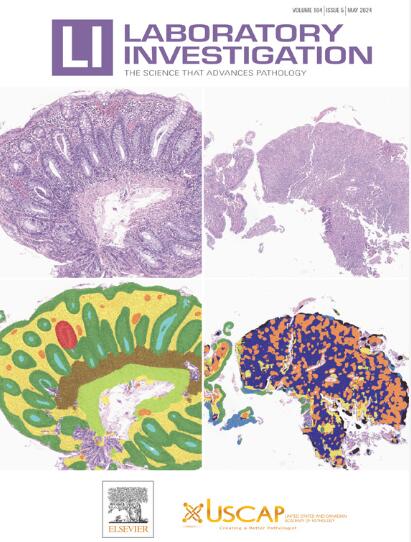Prognostic and Predictive Value of Microsatellite Instability Analysis in Circulating Tumor DNA Using Digital Droplet PCR for Patients With Microsatellite Instability Colorectal Cancers
IF 4.2
2区 医学
Q1 MEDICINE, RESEARCH & EXPERIMENTAL
引用次数: 0
Abstract
Deficient mismatch repair (dMMR) and/or microsatellite instability (MSI) colorectal cancer (CRC) is highly sensitive to immune checkpoint inhibitors (ICI). It is thus becoming increasingly relevant to monitor circulating tumor DNA (ctDNA) and to determine the MSI status (ctDNA-MSI) in CRC. So far, few studies have explored this, even though it could be particularly relevant in evaluating treatment efficacy in patients with dMMR and/or MSI CRC. The ctDNA DIgestive cancers MSI study (ADI-MSI) aims to assess the value of ctDNA-MSI as a predictor of ICI efficacy. Blood samples were collected prospectively in a single-center cohort to analyze circulating cell-free DNA (cfDNA) and ctDNA-MSI before the start of and during treatment. ctDNA-MSI was measured using digital droplet PCR with the 5 microsatellite markers of the Pentaplex panel (Promega Corporation). The primary endpoint was to evaluate ctDNA-MSI levels as a predictor of progression-free survival (PFS). We included 54 patients with dMMR and/or MSI CRC, most of whom had metastatic disease (77.8%) treated in the first (25.9%) or second line (42.6%) with ICI. High-baseline cfDNA and ctDNA-MSI were associated with worse PFS and overall survival. ctDNA-MSI kinetics, but not cfDNA kinetics, was associated with treatment response (P = .006), PFS (P = .03), and overall survival (P = .04). ctDNA-MSI kinetics divided into 3 groups (increase, decrease, and negative) correlated strongly with PFS (PFS at 24 months was 0%, 53.0%, and 77.0%, respectively; P < .001) and remained significant in multivariate analysis (hazard ratio = 7.93; 95% CI, 2.23-28.21; P = .005). As there is no strong predictor of ICI efficacy in patients with dMMR and/or MSI CRC, these results suggest that ctDNA-MSI could help physicians in treatment decision-making in the future.
应用数字微滴PCR分析循环肿瘤DNA微卫星不稳定性对微卫星不稳定性结直肠癌患者的预后及预测价值
缺陷错配修复(dMMR)和/或微卫星不稳定性(MSI)结直肠癌(CRC)对免疫检查点抑制剂(ICI)高度敏感。因此,监测循环肿瘤DNA (ctDNA)和确定CRC中MSI状态(ctDNA-MSI)变得越来越重要。到目前为止,很少有研究对此进行探讨,尽管它可能与评估dMMR和/或MSI CRC患者的治疗效果特别相关。ctDNA消化道肿瘤MSI研究(ADI-MSI)旨在评估ctDNA-MSI作为ICI疗效预测因子的价值。在单中心队列中前瞻性地收集血液样本,分析治疗开始前和治疗期间的循环无细胞DNA (cfDNA)和ctDNA-MSI。ctDNA-MSI采用数字液滴PCR技术,采用美国Promega公司Pentaplex面板的5个微卫星标记。主要终点是评估ctDNA-MSI水平作为无进展生存期(PFS)的预测因子。我们纳入了54例dMMR和/或MSI CRC患者,其中大多数患者有转移性疾病(77.8%),接受了一线(25.9%)或二线(42.6%)的ICI治疗。高基线cfDNA和ctDNA-MSI与较差的PFS和总生存期相关。ctDNA-MSI动力学与治疗反应(P = 0.006)、PFS (P = 0.03)和总生存期(P = 0.04)相关,而与cfDNA动力学无关。ctDNA-MSI动力学分为3组(升高、降低和阴性)与PFS密切相关(24个月时PFS分别为0%、53.0%和77.0%;P & lt;.001),多因素分析仍有显著性差异(风险比= 7.93;95% ci, 2.23-28.21;P = .005)。由于在dMMR和/或MSI CRC患者中没有强有力的ICI疗效预测因子,这些结果表明ctDNA-MSI可以帮助医生在未来的治疗决策。
本文章由计算机程序翻译,如有差异,请以英文原文为准。
求助全文
约1分钟内获得全文
求助全文
来源期刊

Laboratory Investigation
医学-病理学
CiteScore
8.30
自引率
0.00%
发文量
125
审稿时长
2 months
期刊介绍:
Laboratory Investigation is an international journal owned by the United States and Canadian Academy of Pathology. Laboratory Investigation offers prompt publication of high-quality original research in all biomedical disciplines relating to the understanding of human disease and the application of new methods to the diagnosis of disease. Both human and experimental studies are welcome.
 求助内容:
求助内容: 应助结果提醒方式:
应助结果提醒方式:


